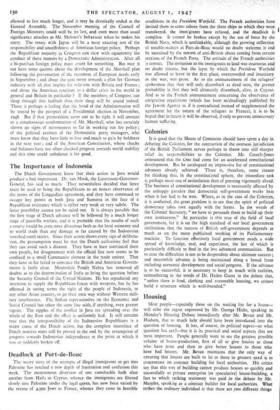Colonies
It is good that the House of Commons should have spent a day in debating the Colonies, for the contraction of the overseas jurisdiction of the British Parliament serves perhaps to throw into still sharper relief its responsibilities to the Colonies. Mr. Creech-Jones announced that the time had come for an accelerated constitutional development. But he catalogued an impressive list of constitutional advances already achieved. There is, therefore, some reason for thinking that, in the constitutional sphere, the immediate task is perhaps more one of assimilation than of pressing vigorously ahead. The business of constitutional development is necessarily affected by the unhappy paradox that democratic self-government works best when it has had to be won. Where, as in the case of the Colonies, it is conferred, the great problem is to see that the spirit of political democracy takes root equally with the forms. In the words of the Colonial Secretary, " we have to persuade them to build up their own institutions." In particular is this true of the field of local government, for it is on the high standard of our local government institutions that the success of British self-government depends as much as on the more publicised working of its Parliamentary machine. To function effectively local government needs a wide spread of knowledge, zeal, and experience, the last of which is particularly difficult to find in the less advanced communities. But to state the difficulties is not to be despondent about ultimate success; and meanwhile advance is being maintained along a broad front including economic development and social progress. If the advance is to be successful, it is necessary to keep in touch with realities, remembering in the words of Dr. Haden Guest in the debate that, " unless there is food, clothing and reasonable housing, we cannot build a structure which is well-founded."


































 Previous page
Previous page